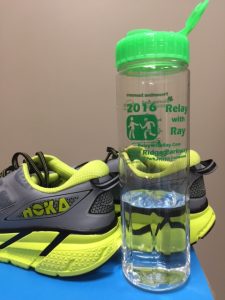How does one train to run 20 miles per day for 4 weeks? Run... a lot!

The biggest problem is time--how does one be a Spouse, Father, Grandfather, Friend, Professor, Business Owner, Forecaster (aka, "have a life") and still find time to train to run that distance?
I'm a RRCA Certified Running Coach. The coaching certification course does not cover how to train for an event like this. However, I did adopt a few basic running training principles for RelayWithRay:
Run slow to run more
My tendency for years has been to run too many training miles too fast. The result has been more injuries than I should have experienced. The average training pace for RelayWithRay was about 1 minute per mile slower than my best marathon pace. I only ran fast once--a 5K race involving 35 of my Appalachian State University students. (I beat all but 2! :-))
Don't run 140 miles/week to Prepare for 140 miles/week
I have been gradually increasing mileage for RelayWithRay since late December. A 10% increase in miles per week, but back off some every third week--that's the typical plan. Last week I ran 70 miles. Is that enough to get my legs ready for the long grind? I hope so. I was afraid that by running more, I would do more harm to my old body than good. Training to do one's best is usually a fine line between peak performance and breaking something; that "window of opportunity" gets smaller with age.
The goal for the last 2-3 weeks has been to run as many miles my schedule and my legs would allow. I'll run RelayWithRay at a slower pace than I trained. I'm gambling that fewer training miles at a somewhat faster pace will translate to more miles run more slowly during the event. And I will walk some each day to reduce total wear on my body.
Pamper beaten down muscles
Almost every week for the past 6 weeks, I have gotten a deep-tissue, sports massage from Heavenly Touch Spa in Boone. Additionally, I have soaked in hot water with Epsom Salts 2-3 times per week.
Core strengthening
I'd be lying if I told you I had done "due diligence" with core strengthening exercises. But I should have. A yoga for runners/cyclists should have been a part of my routine.
Weight control
I have lost 11 pound so far while training for RelayWithRay; however, I'll purposefully go into the event about 10 pounds heavier than my goal marathon race weight. My thinking is that I will lose weight during the event. If I stared at "race weight", I'd be emaciated by the end of the event. A 10-pound weight loss is expected during the 4 weeks of running.
Avoiding Injury
If you are a runner, avoiding and sometimes managing injury is a way of life. I've had more than my share mostly due to bad habits--running too fast too often, not taking the time for core strength workouts, etc. But a contributing factor to the injuries is simply how my body is made--I'm stiff as a board. As one athletic trainer told me, "you are an anatomical mess." But every serious runner needs medical professionals to help when something breaks. And I'm driving a Model T, and stuff breaks fairly often. During the past seven years, my injuries have included: a high hamstring attachment issue took many months to heal ("my royal pain in the butt"); chronic Achilles tendinitis requires my attention consistently, and a tight IT Band has to be worked out frequently. My go-to medical professionals for years have been: Appalachian Regional Orthopaedic & Sports Medicine, Appalachian Regional Internal Medicine Specialists, Marathon Chiropractic Clinic, and a big assist from an Athletic Trainer at App State. The pampering mentioned above does much to keep me out of medical offices.
You might ask, "Why all the trouble and cost of this for running? Isn't the goal just to be healthy?" to which I answer, "I'd rather be seeing the orthopedists now than the cardiologists later!"